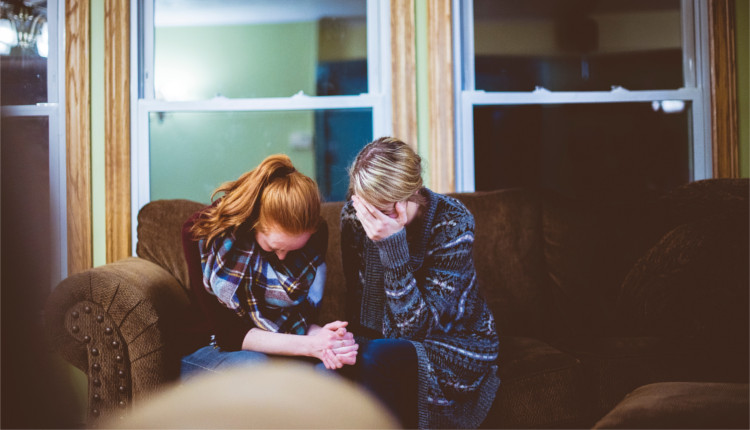Dating with Baggage
I’m on a first date. All is going well. We’re having the usual pints and chit chat. Getting to know each other in this capacity is easy. You don’t need to know the grisly details just yet. What do you do for a living? Where have you travelled? Let’s air the best versions of ourselves possible. But then it arrives. The dreaded question, seemingly inconspicuous and masking as inconsequential.
‘Who do you live with?’
Harmless enough, I know. And in and of itself, it is. But my answer of ‘My sister’ will without fail, lead to more questions.
‘Did you move in together?’
‘No.’
‘Well… what..’
‘It’s my family home.’
‘Right, right…. where are your parents?’
I’ll answer abruptly. Try to make it clear that this is not a topic they want to delve into, that these are dangerous waters. ‘My dad lives in Berlin.’ I’ll say, and avoid eye contact. End of discussion. No more questions. But of course, as I’ve found so many times in my twenty-something years, people can rarely take a hint.
‘Did he move out? What about your mother?’
Ah. Yes. There it is.
Call me old-fashioned but it feels a little less than romantic to let someone you’ve known a week that you’ve endured your worst nightmare. Please, let me keep my dignity in this situation. I don’t want your sympathy, I don’t want you to grab my hand. I’m trying to be an idealised me – a mosaic of interesting and sweet and attractive. But when it comes to something so desperate, so tragic, who can help themselves? The eyes widen. There’s a barely audible gasp.
‘Oh’ they whisper. ‘I am so sorry.’
Yeah, you and me both buddy.
Dating with ‘baggage’ is common. We all have it. Maybe it’s a mental health issue, maybe it’s a dead parent. If you’re me, it’s both. I struggled with the former as it was – people seeing me in the midst of an episode, hysterically sobbing while punching myself in the head to make my brain stop would put just a little bit of a strain on the relationship. But at least we were at the stage where we were already in a relationship. With everything that’s happened in the last few years, my baggage is now out in the open less than one coffee in.

Now, don’t get me wrong. I’m not ashamed of what I carry. On the contrary, I have talked and continue to talk openly about watching a loved one die from cancer. It’s a huge part of me, and one that has ultimately shaped me into the person I am today. But when someone is just getting to know you, and building this picture of who you are inside their head, something that huge is inevitably going to take over. I’m no longer the tall writer who dreams of living in a forest with her cat and making herbal remedies. I’m not the woman who feeds the birds during winter, I’m not the Radiohead fanatic, I’m not the person who cries at adverts for IKEA. I’m not the student, or the amateur ballet dancer, or the shrill feminist. I’m none of those things anymore. I’m just the woman who lost her mother way too young.
There’s a struggle when you’ve suffered a bereavement. Not just the obvious rigmarole of getting through the day without completely falling to pieces, but the struggle of retaining your identity. You’ve lost a piece of yourself. You don’t know who you are without that person. What you should do? How you should act? Where you should go? Are you allowed to be happy? Are you even allowed to be you?
And once that initial feeling of guilt for carrying on and enjoying yourself fades, you are consistently dragged back. Sometimes it’s by people who see characteristics of the deceased in you, and try to bring it out. Irritating, sure. But tolerable. In these cases however, it’s by a complete stranger who feels entitled to every last detail. You become reduced to a story, and this leads to a certain level of aloofness. You don’t want people to know you. You don’t want to be reduced to your pain. And so every new person is held at arm’s length, even the good ones. Especially the good ones. It’s a vicious cycle.
In my case, I experienced years of sifting through the hollow sympathy and morbid curiosity before finding a person that was willing to put up with the trauma. We had dated in the past, but it was unceremoniously cut short by my never ending fear of letting anyone in. It took months of intense, heavy therapy, and even more intense, heavy whining on my private Twitter for me to finally accept that I didn’t want to be alone. And that my baggage had potentially cost me a relationship with a wonderful person.
Luckily, by way of coincidence, he tumbled back into my life. After many long, difficult conversations we decided to give it another shot, and have adored each other since. It’s not always perfect. We’re still adapting, still negotiating. I’m learning how to ask for help, and he’s learning how to encourage me to talk. Two days ago, he saw me cry for the first time.
The thing is, pain in any form will affect aspects of your life. Even in ways you never expected. And as tempting as it is to let yourself be reduced to your experiences, you mustn’t let it happen. It only causes more unnecessary suffering.
Dating with baggage is work. But dating someone who will help you carry that baggage? That makes all the difference.
